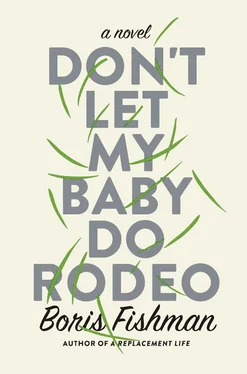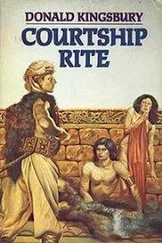“Fall is coming,” he said philosophically.
“You kept going,” she said.
“I wasn’t tired,” he said unpersuasively.
“Under cover of night, you covered as much ground as you could to get this over with sooner.”
He didn’t look up at her, instead working at something in the grass with his foot. Alex had found that, as he became older, people were more willing to take him at his word. He interpreted this as evidence of an increasing substantiveness, a coherence into someone possessed by ideas and opinions that raised no doubts among others. At the office, his father dealt with him as an equal partner, deferring to his views on Turkish versus Georgian kashkaval , and the secretary rushed to address his requests with the slight fearfulness and apology that indicated respect. At home, his mother and father stated their opinions, the former cautiously and the latter insistently, but the decisions were Alex’s. Only his wife strayed from this pattern. Not always, and when she didn’t, he thought of her reserve and cooperation as another benediction of aging, wisdom, maturity. But then the other Maya would come. He wondered if all these things worked differently for women.
They had left Chicago the previous morning after three days of house arrest by Eugene’s older brother Karl and his wife, Dora. Each day, they awoke in a cramped corner bedroom with a low ceiling, were herded into the also low-slung living room — the house, like the woman who ran it, was short and wide, one endless floor-through — and were incarcerated there as one meal turned into another, the holes in conversation filled by the crystal carafe in Karl’s hand and aphorisms he had clipped from the Russian newspaper. Dora occasionally appeared to switch serving plates and immediately vanished back to the kitchen — she seemed unstarved for Karl’s insights — except for a period on Saturday afternoon when she left the house altogether (Alex and Maya gazed at her departing frame longingly) and came back with half a dozen silk shirts for Max and Alex from Marshall’s. Maya wondered why she had been passed over, but eventually decided it was a compliment of sorts — unlike the men, who would wear a burlap sack if it buttoned easily, women could not presume on each other’s behalf.
Maya did not think of her own home as particularly Americanized, but next to Karl and Dora the Rubins were indigenous. In these fifteen hundred square feet of America, the Soviet Union lived on, long after it had exhaled its final breath elsewhere, a hallucinatory enclave where linoleum covered the floor and the wallpaper sagged with a Persian rug. What nation was this? Every evening, Maya and Alex staggered back to their bedroom, bloated on carp and Karl’s wisdom. It bred a beleaguered solidarity between them that had now been destroyed by Alex’s reckless action.
“We were supposed to see places,” Maya said.
“We are supposed to see the parents ,” Alex said. The cigarette smoldered in his fingers. Maya, her back to the keening strain of motors from the road, felt that each passing driver was studying the foreign couple off on the shoulder. Studied from both sides, by cowlike humans, and humanlike cows.
“We were supposed to observe Max,” Maya said.
“He’s not a pelican, Maya, to be studied in his native habitat,” Alex said. “Fall is coming. Do you know what happens when fall comes to these places? It doesn’t. There’s a fart of summer and then it’s winter for nine months. Our winters back home look like a sprinkle of snow next to it. So let’s get there.”
“But I wanted you to ask me before you did it,” Maya said.
“Where exactly do you plan to deposit him while we go meet these people? You’re going to find a babysitter in that town?”
“I don’t know, Alex. We’ll figure it out.”
He shrugged and flicked the cigarette into the grass. It was a reckless trip — three voyagers into the gloom, on the doorstep of winter.
“Why are you smoking?” she said.
“Why are you smoking?” he said, and nodded at the car where, indeed, the glove compartment held a pack of Parliament 100’s that Maya had impulsively bought along with the other things.
She tightened her shawl. She craved coffee. Hot, lip-scalding coffee. Terrible coffee, weak and plain, a pale perimeter rimming the blackness. Maya had glimpsed enough movies to know this was the kind of coffee they drank out here. She wanted some.
She stared at the humpbacked brown bestiary in the distance. The earth looked tired. Someone had spent it. Little tufts of green shrub rose here and there, like the indecisive patches on Alex’s chest. Like Rubins — erstwhile of the same square mile in Minsk — dispersed across the broad back of America: Eugene’s brother in Chicago; Eugene’s second cousin in Omaha; Raisa’s second cousin in Denver; someone, Maya could never remember who, in San Francisco. It turned out, given the chance, they all preferred to live far away from one another.
However, the land spread voluptuously, disdainful of restrictions, and this lifted her. The openness was heedless, spoiled, uneconomizing. It sprang something in her chest, got out of her a clutching deep exhalation, transmitted a clarifying signal to the haze in her head. The white oblong birds watched the cows, the cows watched her, she watched the brown ridgeline, and the brown ridgeline watched everything. She liked being in the relay.
“Don’t you want to know where we are?” Alex said.
“No,” she said. It came out resentfully, a petty revenge — she was not asked where to go, and so she would not ask where they’d gone — but she didn’t mean it that way. On the cusp of inquiring, she decided not to inquire. She enjoyed not knowing. She even enjoyed not knowing why she enjoyed not knowing. There was a weightlessness to it — her husband had unwittingly kidnapped her from the designated and mapped. How could anyone try to reach her if she didn’t know where she could be reached? She watched his face struggle with the senselessness of her answer.
“Maya, what is all this for?” he said. “It’s a fool’s errand.”
She shrugged and pulled again on the shawl, setting off a shudder of pain from her neck to her fingertips. “I thought. .” she started, but trailed off.
“Let’s just hope nothing bad happens,” Alex said.
She needed a cup of coffee, an ibuprofen for her neck, a cigarette. “We need to find a campground,” she said.
“A campground?”
“I want to camp with my son. You said cold is coming: Better to do it sooner.”
“I don’t understand,” Alex said, spreading his arms.
“Your preference is to spend the night in a vehicle,” she said. “I also would like to not sleep in a bed.”
“Maya, I don’t want to sleep in a tent.”
“I didn’t want to sleep in a car, but you didn’t ask. You can rent a hotel room. Max and I will sleep in a tent.”
“What is it you expect to find out?” Alex raised his voice. “You think he’ll sit up in the middle of the night and confess to you the secret of his being? We had a tent in the backyard.”
She looked past Alex’s shoulder. If she spoke, she would say something that would scatter the last of the goodwill stored up in Chicago. The morning fog was dissipating, setting loose a golden light streaked with pink. The brown humps had turned blue. If she kinked her head — fresh stab of pain — they looked like the shoulders of a beheaded colossus, buried below the rib cage, and the stony wrinkles that ran up and down the rock were his strain at trying to lift himself from the earth. Dumpy clouds hopped above the shoulders like little white horses.
Why did the hills in the distance becalm her with their mute, maintaining consistency, but the same quality in her husband made her unhappy? Was the vision in the distance especially majestic, or was she especially impatient?
Читать дальше












